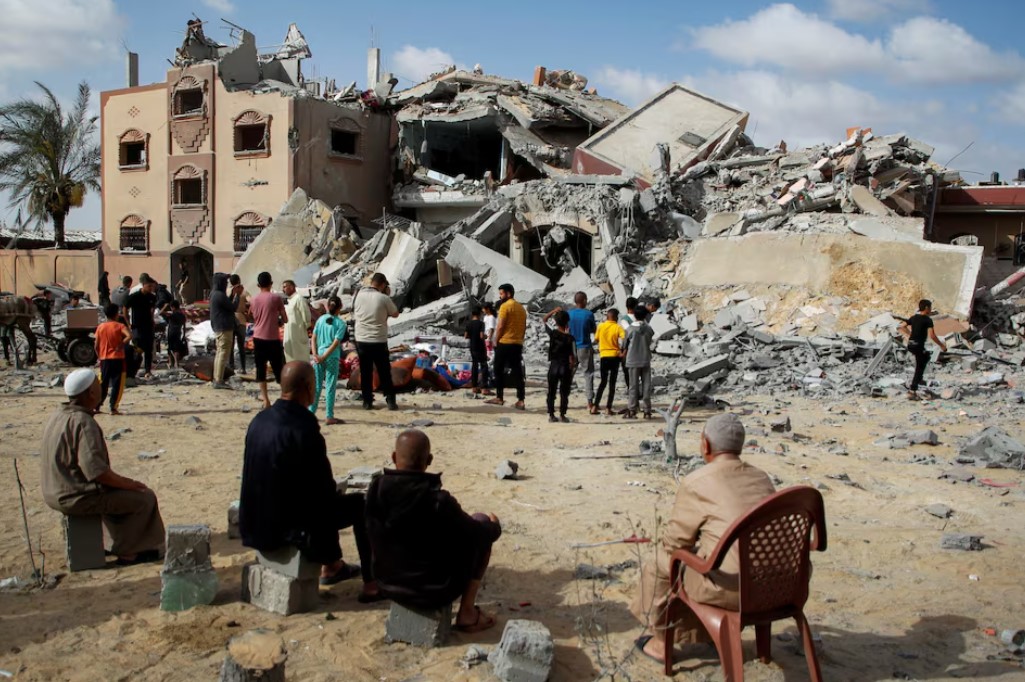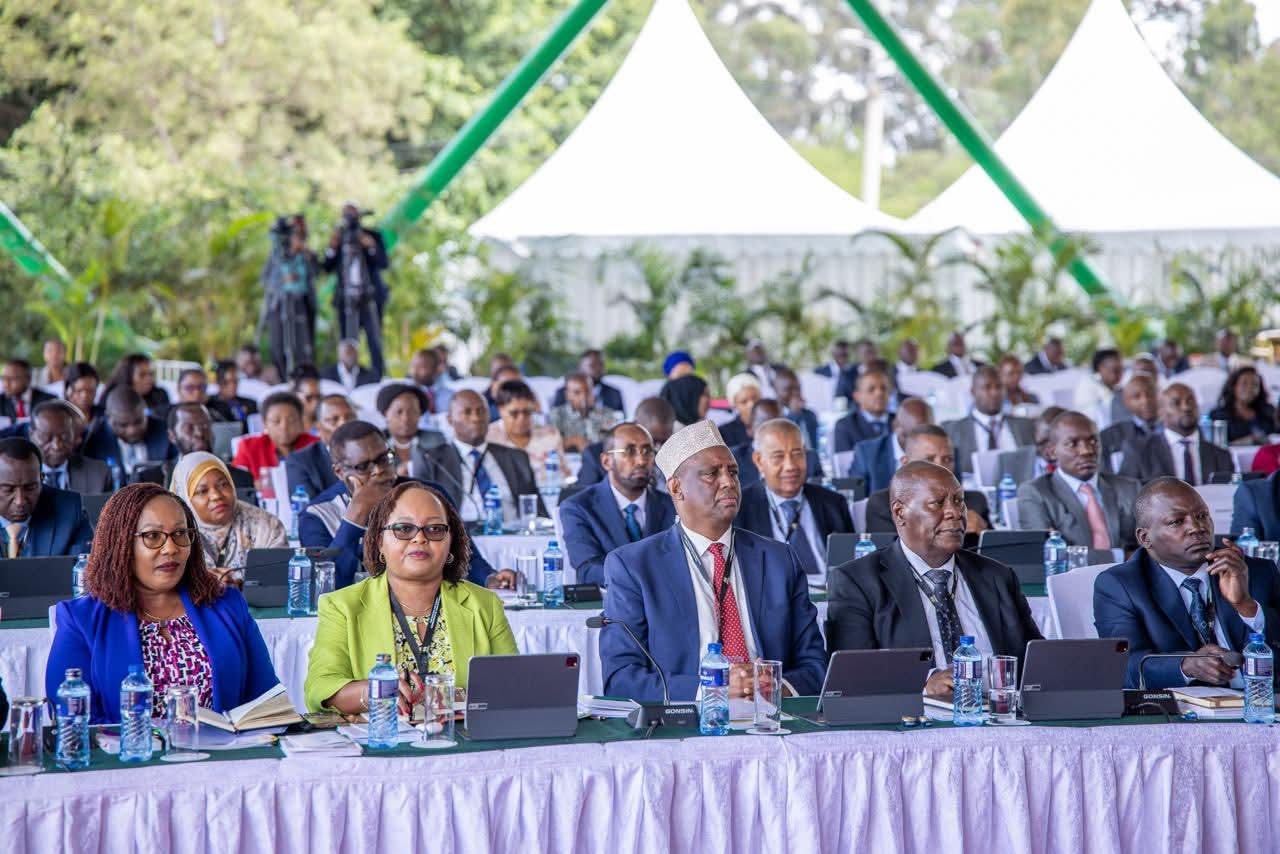New report reveals devastating human, economic toll of prolonged Gaza war on Palestinians

Nearly half of the population is grappling with catastrophic levels of food insecurity.
The prolonged war and onslaught on Gaza, now in its eighth month, continues to devastate the lives and livelihoods of Palestinians, according to a recent report by the International Labour Organization (ILO) and the Palestinian Central Bureau of Statistics (PCBS).
The Israeli-Hamas war has resulted in staggering human and economic losses, deeply impacting every sector of the economy in the Occupied Palestinian Territory.
More To Read
- 19th Goodness Ship departs Turkey carrying 1,300 tons of humanitarian aid to Gaza
- UN’s Guterres vows to push for Palestine two-state solution, says he will ‘not shut up’
- Israeli raids and settler attacks deepen humanitarian crisis in West Bank
- Palestinian militia leader working with Israel killed in Southern Gaza
- Gaza’s once-growing economy nears total collapse amid war and blockade
- ‘Decisive action’ needed to end Israel-Palestine stalemate, UN warns
As of May 29, 2024, the war has claimed the lives of 36,171 Palestinians and injured 81,420 others. Agencies have confirmed nearly half of the population is grappling with catastrophic levels of food insecurity.
According to new data and analysis by the ILO and the Palestinian Central Bureau of Statistics, the widespread devastation has not spared any sector, with the housing sector bearing the brunt.
A joint interim damage assessment by the World Bank, EU, and UN estimates direct damages to Gaza's built infrastructure at approximately USD 18.5 billion.
Profound economic repercussions
The analysis conducted by the ILO in partnership with the Palestinian General Federation of Trade Unions (PGFTU) noted that economic repercussions remain profound.
The report noted that real GDP in the Occupied Palestinian Territory contracted by 32.8 per cent during the first eight months of the war, with an 83.5 per cent decline in Gaza's GDP and a 22.7 per cent contraction in the West Bank.
This significant economic contraction has reduced Gaza's share of the total Palestinian economy from 16.7 per cent to 4.1 per cent.
It shed light on the disproportionate impact on Gaza compared to the West Bank, the occupied Palestinian Territory.
 Palestinians look at the site of an Israeli strike on a house, amid the ongoing conflict between Israel and Hamas, in Rafah, in the southern Gaza Strip May 5, 2024. (Photo: REUTERS/Hatem Khaled)
Palestinians look at the site of an Israeli strike on a house, amid the ongoing conflict between Israel and Hamas, in Rafah, in the southern Gaza Strip May 5, 2024. (Photo: REUTERS/Hatem Khaled)
From October 2023 to January 2024, half of the private sector establishments experienced either complete cessation or reduced production.
In Gaza, the private sector lost 85.8 per cent of its production value, equating to an estimated loss of USD 810 million, while the West Bank saw a 27 per cent reduction, amounting to USD 1.5 billion.
Overall, the Occupied Palestinian Territory incurred an estimated loss of USD 2.3 billion in private-sector production value during this period.
The conflict has exacerbated unemployment, which surged to an average of 50.8 per cent in the OPT, with Gaza experiencing an alarming 79.1 per cent unemployment rate and the West Bank nearly 32 per cent.
Projections suggest that if the war continues until August 2024, the annual unemployment rate could rise to 47.1 per cent.
Job losses
These figures represent a significant deterioration in the labour market, with the conflict disrupting economic activities and causing widespread job losses.
A survey conducted by the ILO and the Federation of Palestinian Chambers of Commerce, Industry, and Agriculture (FPCCIA) revealed that 98.8 per cent of enterprises in the West Bank have been adversely affected by the conflict, leading to reduced operations, production capacity, and sales.
About 65.3 per cent of these enterprises have reduced their workforce, with many implementing permanent or temporary layoffs. Additionally, 73.3 per cent of businesses have cut working hours to manage costs.
 Palestinians eat food cooked by a charity kitchen near houses destroyed in the Israeli military offensive, in Khan Younis in the southern Gaza Strip, May 30, 2024. (Photo: Ramadan Abed/Reuters)
Palestinians eat food cooked by a charity kitchen near houses destroyed in the Israeli military offensive, in Khan Younis in the southern Gaza Strip, May 30, 2024. (Photo: Ramadan Abed/Reuters)
Workers have faced significant hardships, with many losing their jobs or experiencing reduced hours and wages.
A survey by the ILO and the Palestinian General Federation of Trade Unions (PGFTU) indicated that 51 per cent of employed workers have seen their working hours reduced, and 62.8 per cent have faced wage reductions.
Among those who lost their jobs, only 31.4 per cent reported receiving end-of-service entitlements.
"Our new bulletin shows that the grim toll the war in the Gaza Strip has taken on human lives, and the desperate humanitarian situation it has caused, is accompanied by widespread devastation of economic activities and livelihoods. This compounds the suffering of Palestinians in the Gaza Strip and the West Bank and further endangers their safety and well-being," said ILO Regional Director for Arab States Ruba Jaradat.
The findings in the bulletin highlighted the severe impact on workers' livelihoods and the urgent need for measures to protect labour rights and provide support to affected workers.
Households have also borne the brunt of the economic fallout, with 87.2 per cent reporting a decrease in income.
Families have resorted to various coping mechanisms, including reducing expenses on essentials such as food, healthcare, and education, and even sending children to work.
The report noted that 7.4 per cent of surveyed households have resorted to child labour. This depicts a picture of the severe economic challenges faced by many families.
Many children have been forced to leave school to contribute to their family's income, which will have long-term implications for their future prospects and the overall development of the region.
"The increased reliance on child labour indicates a reversal in progress made towards eradicating such practices and highlights the need for targeted interventions to support vulnerable households," said the agencies in the bulletin.
According to the analysis, if the war was to end in August 2024 and economic and labour market recovery efforts followed, then the annual unemployment rate for 2024 is expected to average 47.1 per cent.
The projections also suggest that, under such a scenario, real GDP would plummet by 16.1 per cent and real per capita income by 18.0 per cent in 2024 in comparison to 2023. These figures would represent the most pronounced decline in growth rates for both indicators in over two decades.
The report by the ILO and PCBS urged the international community to increase its support for humanitarian aid and reconstruction efforts in Gaza and the West Bank.
"Immediate actions include providing food and medical supplies, rebuilding damaged infrastructure, and supporting economic recovery programmes. Long-term efforts should focus on creating sustainable economic opportunities, enhancing social protection systems, and ensuring that children can return to school and avoid being forced into labour."
Top Stories Today













































